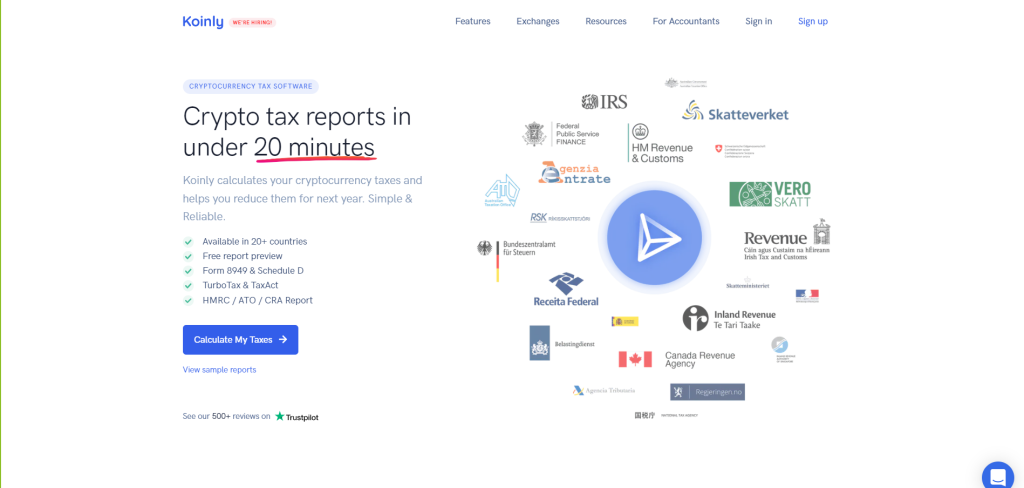
What you'll learn 👉
How does The IRS Knows You Owe Crypto Taxes?
The IRS is gathering more and more information about cryptocurrency transactions.
In order to operate in the US, all significant cryptocurrency exchanges must now finish Know-Your-Customer (KYC) checks on both new and existing users.
Until recently, KYC checks were rather straightforward and simply required basic personal information, such as your name, address, and occasionally your social security number (though that’s still more than enough for the IRS to identify you). However, nowadays, crypto platforms now request more information such as valid and scanned ID documents, banking information, a phone number, and employment details.
To ensure tax compliance, the IRS can (and most likely will) request data from cryptocurrency exchanges.
Do crypto exchanges report to the IRS?
Numerous powerful and popular cryptocurrency exchanges have already confirmed that they file tax returns with the IRS.
In the past, precisely in 2016, Coinbase was served with a John Doe summons by the IRS. With the help of a John Doe summons, the IRS needs to obtain user information from a specific exchange in order to identify, audit, and prosecute tax avoiders. Similar cases brought by the IRS against Kraken and Poloniex have been successful since 2016.

For those not familiar with the term, the summons involves the investigation of a specific individual, knowable group, or class of individuals.
Numerous crypto exchanges have been forced to comply and work with the IRS and their requirements due to the success of these summonses and the other rules they must go by in order to conduct legal business in the US. In March 2021, Operation Hidden Treasure was launched. The relationship between the IRS and the civil office of fraud enforcement is made up of specialist staff with experience in tracking cryptocurrencies and digital assets.
Why does the IRS want to know about cryptocurrency?
Since the IRS views cryptocurrency holdings as “property” for taxation purposes, your virtual currency will be taxed similarly to any other assets you may own, such as stocks or gold.
Which do crypto exchanges report to the IRS?
It’s impossible to say with certainty how many or specifically which cryptocurrency exchanges are filing reports with the IRS. Since secrecy is one of the cornerstones of cryptocurrencies, several exchanges are justifiably cautious to publicize this to their users. However, we can list exchanges we are 100% sure to send reports to the IRS.
Before we list them, it is worth mentioning that all of these exchanges send 1099 forms to IRS since they want to stay in a good relationship. 1099 forms serve as a record of an individual taxpayer’s income. The IRS receives a copy of every 1099 form that you get, regardless of its size or shape.
The cryptocurrency exchanges that are providing 1099 forms to the IRS are:
- Coinbase
- Coinbase Pro
- Coinbase Prime
- Binance US
- Gemini
- Kraken
- Bitstamp
- eToro
- Crypto.com
- Uphold
- Bittrex
- Robinhood
- PayPal Crypto
- Celsius
Keep in mind that this list will most likely go bigger in the upcoming years. More and more cryptocurrency exchanges will have to send 1099 forms to the IRS in order to comply with them and avoid any possible penalties.
When do crypto exchanges report to the IRS?
The IRS and the taxpayer will often receive 1099 papers in January or February for the previous tax (calendar) year.
However, the IRS is currently looking into a number of cryptocurrency exchanges, including Binance (as one of the largest crypto exchanges globally). It is almost impossible to predict whether or when these crypto exchanges will provide the IRS access to their data.
Are there any crypto exchanges that don’t report to the IRS?
If we think logical, then you would probably be safe that the IRS does not know about your crypto transactions if you work on decentralized exchanges (DEX) or on an exchange where there is no mandatory KYC (Know Your Customer/Client) verification process. However, keep in mind that even then, you are not 100% sure that the IRS does not know about you and your trades.
Nevertheless, you are correct that as of right now, there has not been any IRS cryptocurrency news regarding any DEX reporting to the IRS. The majority of them do not gather KYC information, so even if they receive a John Doe Summons, they would not have much to provide and send to the IRS.
Having said that, many of the browser wallets request you to connect with a specific DeFi protocol that may require KYC checks, and even more importantly, many of them require you to link a bank card or account. The IRS will need to be informed of any withdrawals or deposits into your bank account, so be careful when withdrawing crypto funds to your bank.
Finally, keep in mind that when you are moving crypto assets between wallets and exchanges, the IRS might find out about it.
What do I need to report about crypto to the IRS?
Usually, the IRS wants extremely detailed information about your crypto assets and crypto transactions. This information will include:
- The extract date of each transaction occurred
- Your cost basis or the cryptocurrency’s fair market value expressed in USD on the day you purchased it
- Fair market value in USD of your cryptocurrency on the day you sold it
- Any capital gain or loss you incurred as a result of every transaction
- What was being purchased and who was buying it
- Purchase and sale receipts
- Transaction and transfer history from all of your crypto wallets and exchanges
What about NFTs?
At the time of writing, there are no clear rules on how the IRS will tax NFTs. One thing is certain, though, they will definitely find a way to tax NFTs. However, the IRS only tax fungible tokens for now.
NFTs, however, are probably collectible for taxation purposes. Comparing collectibles to investments like stocks, bonds, and cryptocurrency, the maximum tax rate on capital gains is higher for collectibles.
NFTs may be collectibles, though the IRS hasn’t stated this specifically, allowing some space for speculation. The IRS has classified these items as tangible collectibles subject to a higher tax rate, although many tax experts believe they definitely belong in the same category as art, antiques, jewels, medals, stamps, and coins.
How does the IRS know your cost basis?
Are you tempted to change your cost base and therefore reduce your tax liability?
Keep in mind that tax avoidance is, and the danger and risk are not worth it. The IRS can compare cost basis and the cost basis methodologies for cryptocurrency from your past tax returns, even though they may not be able to draw any conclusions from a single tax return. The IRS might do checks on you if there are inconsistencies.
A three-year statute of limitations typically applies to IRS audits. However, the IRS has six years to audit such tax returns if the cost basis was overstated by 25% or more.
What should I do if I forget to report my cryptocurrency in previous years?
Even though you can indeed forget or “forget” about your crypto taxes, the IRS will look at it as tax fraud, and there are no limits on how far they will look into your case. However, there are a few ways how you can completely avoid tax penalties from the IRS.
If you did forget to report your crypto taxes, then probably the wisest thing you can do is amend your tax return for the years you neglected to disclose cryptocurrency. To file an updated return, you have three years from the time of your first filing. The important note here is that those who take the time to go back and make the necessary tax corrections are way more likely to receive tolerance from the IRS.
You must submit an IRS Form 1040X in order to make changes to your tax return. But don’t worry since this process is not difficult since you simply need to file the missing information and not do all of your taxes again.
How do I report cryptocurrency on my taxes?
Do not worry too much about the complexity of how to report your crypto taxes. To file your cryptocurrency taxes, you should comply with the following 5 steps:
- Determine your cryptocurrency gains and losses
- Fill out IRS Form 8949
- Add your 8949 totals on Form Schedule D
- Add any cryptocurrency income
- Finish the rest of your tax return
Crypto tax software that tracks your crypto activity
Koinly

Koinly is one of the most popular crypto tax platforms in the crypto industry. A crypto tax report can be generated using Koinly, a cryptocurrency tax calculator and software, based on your trading, mining, staking, and airdrops activities. It is appropriate for both individual cryptocurrency traders and investors as well as for businesses or professional accountants that work with cryptocurrency investors.
This crypto tax software offers 4 different pricing plans. However, the main difference between the plans is only the number of transactions you can actually import.
Please read our detailed Koinly review.
Zenledger

For people who are not familiar with crypto taxation or the entire cryptocurrency ecosystem, ZenLedger is among the better solutions available. Furthermore, the user interface is really pleasant, but ZenLedger’s high beginner utility goes much beyond having a user-friendly app. In this new era of decentralized finance, ZenLedger was developed for cryptocurrency traders and tax experts who needed a solution to automate the crypto tax accounting process. To provide complete coverage for traders who operate in these kinds of unstable markets, ZenLedger interacts with a wide range of exchanges and cryptocurrency wallets, like many other trackers for cryptocurrencies on the market.
Please read our detailed Zenledger review.
Coinledger.io
A cloud-based program called Coinledger interfaces with cryptocurrency exchanges to gather trading data, which is then used to automatically generate tax reports with a few simple clicks. Therefore, we can safely say this platform is beginner-friendly and easy to use.
With the support of a wide range of exchanges, easy interaction with well-known tax software for automatic report submission, and tiered pricing to suit everyone’s budget, Coinledger is one of the finest cryptocurrency tax calculators, if not THE best.
Please read our detailed Coinledger.io review.
Cointracking
Cointracking is a cryptocurrency portfolio management and cryptocurrency tax software that connects with leading cryptocurrency exchanges to collect your trading and transaction history and then automatically generate tax returns based on it. It supports a variety of annual tax report formats, including those required by the German Income Tax Act, FBAR, Form 8949, and regulations for capital gains. It also allows the automatic import which can save you a lot of time long-term.
Please read our detailed Cointracking review.






